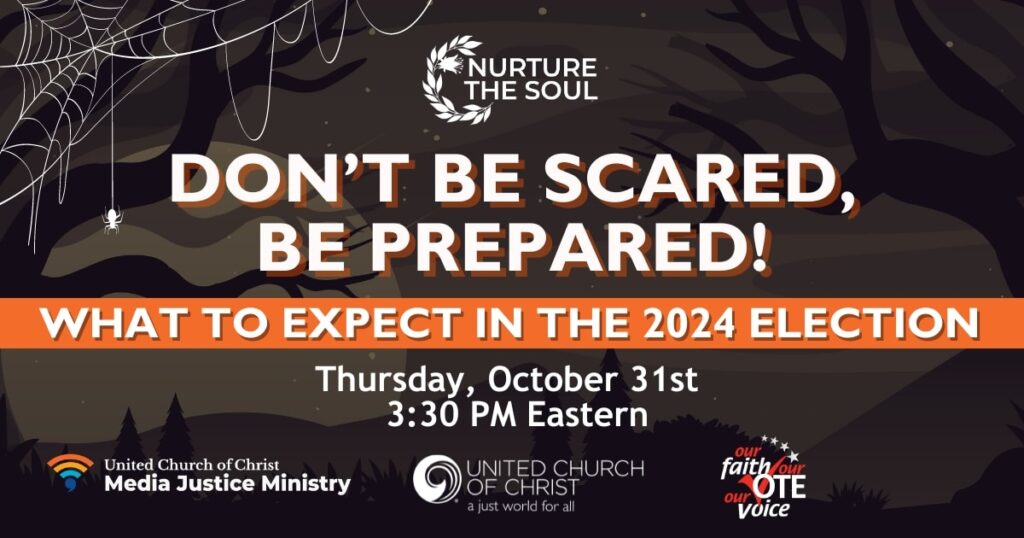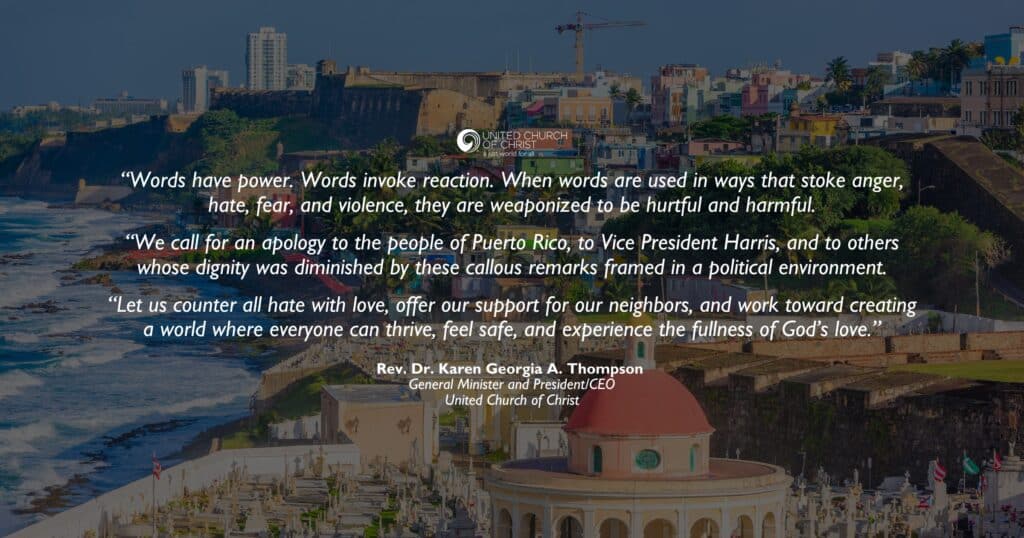Best practices to amplify the UCC’s voice for progressive Christianity
The voices of people of faith, from the United Church of Christ and other progressive Christian denominations, are now more important than ever. A heightened sense of advocacy, to protect people in the margins threatened by new governmental policies, is seen as not only as necessary by church leaders, but critical to the UCC call to love our neighbor as our self, and to create a just world for all.
And, by putting forth some insight on best practices, they are asking the entire church to join the effort.
“The reason faith voices are so important now is having a moral grounding and moral voice for what we think the world could and should be,” said Sandy Sorensen, director of the UCC’s advocacy office in Washington, D.C., “That’s what faith people bring to justice work.”
The Rev. Kelly Burd, pastor of Pilgrim Congregational UCC in Cleveland, is focusing her church’s outreach in a “12 in 12” strategy. Burd is asking each of the members of her church to commit to participate to 12 hours of justice advocacy or community service in the next 12 months.
While Pilgrim Congregational is coordinating for members future opportunities for public witness in the region, there should be plenty of circumstances. Already in the last two weeks in Northeast Ohio, hundreds of demonstrators gathered at Cleveland Hopkins Airport to oppose the White House’s travel ban, welcomed newly-naturalized citizens at a federal courthouse downtown, and rallied in a public park to publicly support immigrants and refugees.
The strategy is one Burd believes could gain traction throughout the denomination and beyond.
“If even 90 people in our congregation opt in and follow through as a means to be the church in the world in a new way, the wider community would benefit from 1080 hours of our collective involvement,” Burd said. “This is something tangible and measurable to help us wrap our minds around the call of Christ and the collective impact of our response on behalf of Pilgrim Congregational United Church of Christ.”
Jessie Palatucci, a communications specialist who works in the D.C. office, pointed out some easy ways UCC members can ramp up their advocacy efforts.
“The first and easiest thing is to make phone calls to Congress, to talk about why an issue matters to you. If you tell a compelling story, those can get passed on to staffers and elected officials themselves,” she said. The U.S. Capitol Switchboard (202-224-3121) can connect callers with their elected representatives.
Palatucci suggests that people already making calls looking to ramp their advocacy to the next level could consider writing letters to the editor of their local newspapers. “Congressional staff track mentions of elected officials in the press carefully. They often clip the letters and forward them to elected officials themselves, so even getting published in a small weekly has a big impact,” she said. “All it takes is 150 words.”
Advocacy doesn’t necessarily mean a trip to Washington, D.C., to meet with a senator or representative. Some of those in-person visits can happen right near home. “There are in-state and in district offices for Congressional members in every state,” Palatucci said. “Staff are usually excited to meet one-on-one with constituents. And a lot of members of Congress do in-state town halls frequently — if you are on Senator’s mailing list, you can get notified and show up when they hold a local town hall or a listening session. Prepare your questions, bring a friend, spread out in the crowd and you’ll double your chance to get your concerns heard during the Q&A time.”
Sorensen believes that advocacy begins by building relationships with key players in federal, state and local government, and members of the media.
“When you contact members of Congress, or state legislatures or even city council — decision-makers at all levels — the key thing is to establish a relationship,” Sorensen said. “It’s more than one phone call or letter. Find out what issues they are passionate about, and offer yourself as a resource. If someone is active on affordable housing, and that’s a part of your congregation’s ministry, then offer that experience.”
“Introduce yourself to media people — local television, radio and newspaper reporters — as a potential source on matters of faith and politics,” she added.
Sorensen also suggested seeking out other faith groups and organizations doing justice work in local communities, and attending those meetings and introducing yourself. There are frequently faith-based coalitions and grassroots organizations already addressing issues of racial justice, poverty, immigration and refugee issues, LGBT equality and more.
“Don’t overlook the importance of prayer and spiritual practice in all this,” Sorensen said. “Find people who share the same concerns, pray together, stay rooted in your faith. That will nourish your work and it will make your work that much stronger. It’s a marathon, not a sprint — change takes time.”
Learn more about the scope of the UCC’s justice work online.
Related News
UCC churches counter Christian Nationalism with social media project: Sharing stories of Christian love
For those wearied by the political rhetoric licking at the nation with its flames of hate and...
Read MoreDon’t Be Scared, Be Prepared: Webinar offers Election Day advice
The calendar said Halloween, but on October 31, the United Church of Christ wanted to help...
Read MoreGMP releases call to denounce offensive, racist comments about Puerto Rico at Trump rally
In the week leading up to Election Day, the United Church of Christ General Minister and...
Read More


